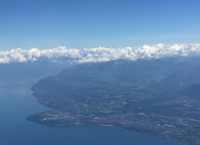|

Day in the Life
 Weather stations
are found everywhere -- at airports, in or near cities, and in isolated and
remote areas. Some atmospheric scientists also spend time observing weather
conditions and collecting data from aircraft. Weather forecasters who work
for radio or television stations broadcast their reports from station
studios, and may work evenings and weekends. Meteorologists in smaller
weather offices often work alone; in larger ones, they work as part of a
team. Those who work for private consulting firms or for companies
analyzing and monitoring emissions to improve air quality usually work with
other scientists or engineers; fieldwork and travel may be common for these
workers. Weather stations
are found everywhere -- at airports, in or near cities, and in isolated and
remote areas. Some atmospheric scientists also spend time observing weather
conditions and collecting data from aircraft. Weather forecasters who work
for radio or television stations broadcast their reports from station
studios, and may work evenings and weekends. Meteorologists in smaller
weather offices often work alone; in larger ones, they work as part of a
team. Those who work for private consulting firms or for companies
analyzing and monitoring emissions to improve air quality usually work with
other scientists or engineers; fieldwork and travel may be common for these
workers.
Most weather stations operate around the clock, 7 days a
week. Jobs in such facilities usually involve night, weekend, and holiday
work, often with rotating shifts. During weather emergencies, such as
hurricanes, meteorologists may work overtime. Operational meteorologists
also are often under pressure to meet forecast deadlines. Meteorologists
who are not involved in forecasting tasks work regular hours, usually in
offices.
Beginning atmospheric scientists often do routine data
collection, computation, or analysis, and some basic forecasting.
Entry-level operational meteorologists in the Federal Government usually
are placed in intern positions for training and experience. During this
period, they learn about the Weather Service's forecasting equipment and
procedures, and rotate to different offices to learn about various weather
systems. After completing the training period, they are assigned to a
permanent duty station.
Experienced meteorologists may advance to supervisory or
administrative jobs, or may handle more complex forecasting jobs. After
several years of experience, some meteorologists establish their own
weather consulting services.
Note: Some resources in this section are provided by the the US Department of Labor, Bureau of Labor Statistics.
|
|